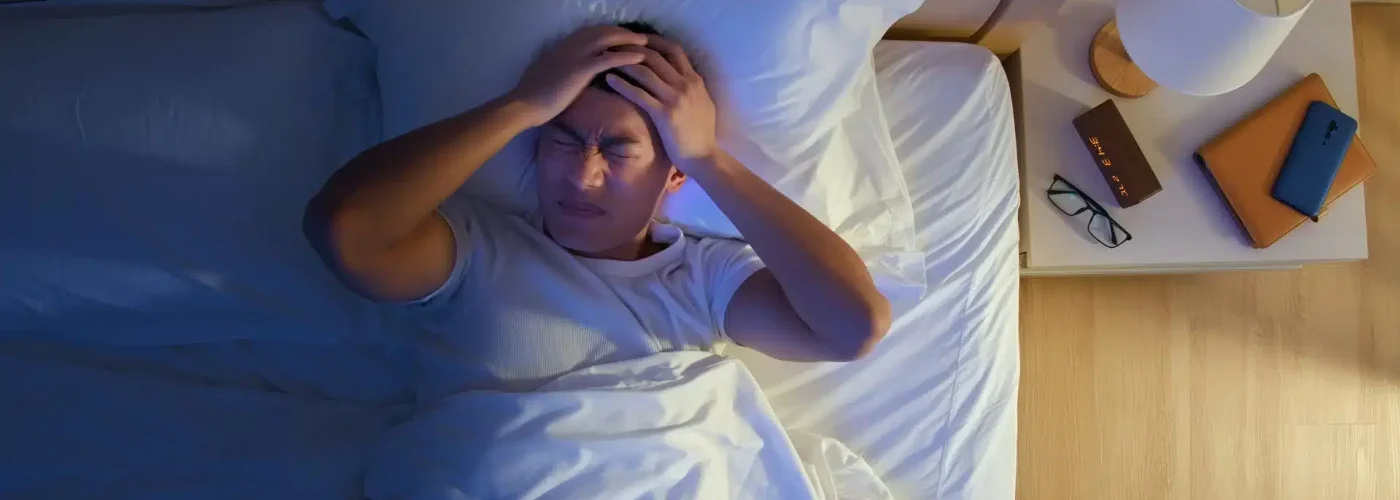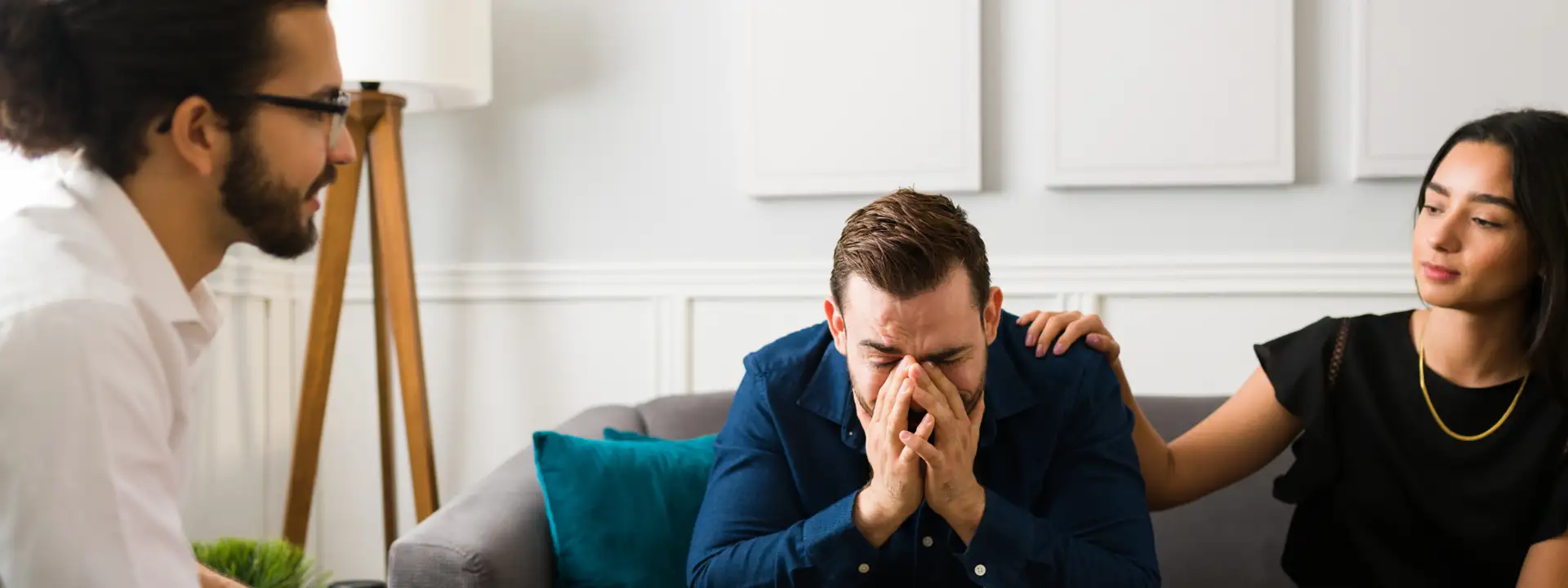There I was—curled up by the window, the city lights of San Diego dancing on my ceiling. The streets outside were quiet. A car drove by. A soft breeze moved the blinds. But inside my mind, it was anything but calm.
Each breath felt heavy. I leaned against the cold glass, begging my thoughts to slow down. But they didn’t. Instead, questions kept circling in my head: Why do I feel anxious before sleep? What’s wrong with me?
Maybe you’ve felt it too—lying in bed, body tense, thoughts racing. Worry about tomorrow. Regret about today. And always the same questions:
- What causes anxiety when trying to sleep?
- Why does it happen so often?
- Why does anxiety when trying to sleep feel so relentless?
This is one of our client’s stories—real, raw, and sleepless. As you read on, you’ll see how she fought, how she broke down, and how, piece by piece, she found hope.
Why Do I Feel Anxious Before Sleep?
I remember whispering this question every night. When the world grew quiet, my thoughts grew loud. Memories I wanted to forget, deadlines I couldn’t meet, fears I never said out loud—they all rushed in.
When I finally came to Alter Behavioral Health, I learned that what I felt had a name: sleep anxiety. I read their blog “Sleep Anxiety: Why Do You Get a Rush of Anxiety When Falling Asleep?” and felt seen for the first time.
The therapists told me my anxiety wasn’t a weakness. It was my body’s way of reacting to stress and old wounds. They gave me something simple to try: progressive muscle relaxation.
At first, it felt silly—unclenching my fists, loosening my jaw, letting my shoulders drop. But then, one night, it worked. My body softened. And slowly, my mind followed.
Science agrees. In their study, Paul Alan Arkin Alvarado-García and colleagues studied adults who practiced mindfulness and relaxation. Over weeks, their anxiety dropped, and their sleep improved. Training the body to let go helped the mind to rest.
Could something so gentle fight something so strong? That question kept me going.
What Causes Anxiety When Trying to Sleep?
Over time, I saw the cycle. Poor sleep made me more anxious. Anxiety made me sleep worse. Round and round I went.
At Alter, the team showed me how daily habits fueled it. Too much caffeine. Hours staring at screens. Staying up late. Waking at random times. All of it fed my sleepless nights.
I tried their tips. Dim the lights an hour before bed. Leave the phone in another room. Wake up at the same time every day. At first, it felt uncomfortable. But slowly, my body began to trust the rhythm.
Research shows why it matters. A large-scale study by Shi et al. (2025) followed nearly 5,000 students. Those with poor sleep were 44 times more likely to have severe anxiety than those with good sleep.
That number shocked me. Could my sleep shape my anxiety that much? The answer was yes.
How to Stop Anxiety Keeping Me Awake?
The cruelest part was this: the harder I tried to sleep, the more awake I felt. I’d toss, turn, and stare at the ceiling. My chest stayed tight.
One night, a therapist at Alter gave me advice that sounded strange: “Stop trying to sleep. Permit yourself to stay awake.”
I laughed. How could that help? But when I practiced it, something changed. The pressure eased. My body let go. And sleep finally came.
This tool is called paradoxical intention, and research published in BMJ Journals (Salim et al., 2024) shows that it works. And Rob Newsom from the Sleep Foundation says the same—when people stop forcing sleep, their anxiety drops, and real rest comes naturally.
Another tool helped, too: the 4-7-8 breathing technique. Inhale for four. Hold for seven. Exhale for eight. Two months ago (in June 2025), Valerija Steinmane and Andre Fernate (2025) showed that this breathing calms the nervous system and lowers heart rate before bed.
For me, it felt like a lullaby for my body. Could breathing be stronger than my anxiety? Little by little, the answer became yes.
What Helps Anxiety When Trying to Sleep?
I noticed patterns. Nights I scrolled on my phone until midnight, my anxiety spiked. Nights I followed a routine—soft light, warm shower, breathing—I stood a chance.
For me, what helped was structure.
Alter Behavioral Health taught me that routines are safety. Trauma makes the body stay on high alert. But repetition retrains it to feel safe again. At their residential program, evenings followed a calm rhythm: gentle light, quiet spaces, and peaceful wind-downs. I brought those same habits into my home.
And research backed it up. In Nature Medicine, Zheng et al. (2025) showed that irregular sleep schedules raise anxiety. But sticking to regular routines lowers the risk.
My rituals weren’t just nice—they were medicine. They healed both my mind and body.
Why Does Anxiety Spike When I’m Trying to Sleep?
Even after progress, I still asked myself: Why does anxiety spike when I’m trying to sleep?
I realized it was the silence. With no noise to distract me, my fears came rushing in. Past mistakes. Future worries. All of it bubbled up in the dark.
At Alter, they taught me to reframe silence. Instead of fearing it, I paired it with grounding tools—soft music, lavender oil, and short journaling. Slowly, silence became comfort instead of threat.
The same 2025 study by Zheng et al. explained why. Deep, restorative sleep helps the brain reset its emotional circuits. That reset lowers the overactive response that triggers nighttime anxiety.
When I finally slept deeply, I didn’t just rest. I healed.
A New Dawn: Quieting the Night
I’ll admit: the struggle isn’t over. But I’m no longer powerless. The nights that once ended in fear now begin with routine, breath, and hope. I don’t fight sleep anymore. I welcome it.
This client’s story shows what’s possible with the right care. At Alter Behavioral Health, healing isn’t about quick fixes. It’s about building peace step by step, through therapy, compassion, and structure. Their mix of CBT, trauma-informed care, and holistic practices helped turn one woman’s restless nights into mornings of renewal.
And maybe, as you read this, you wonder: Could this story become yours?
Ready to Tack Back Your Nights?
Alter Behavioral Health offers personalized residential treatment for anxiety, guided by empathy and science. With locations across California and a team that cares deeply, you don’t have to face sleepless nights alone.
Reach out today. Take back your rest. Let your healing begin.
FAQs
1. What causes anxiety when trying to sleep?
Stress, racing thoughts, and untreated anxiety often grow worse at night when it’s quiet.
2. How to stop anxiety from keeping me awake?
Try gentle tools like 4-7-8 breathing, paradoxical intention, and steady routines.
3. Why do I feel anxious before sleep?
Because the silence lets stressful thoughts you pushed aside all day rise to the surface.
4. What helps anxiety when trying to sleep?
Calming habits, structure, and therapy like CBT can retrain the brain for rest.
5. Why does anxiety spike when I’m trying to sleep?
As outside noise fades, the mind fills the quiet with fears and worries.
6. Is sleep hygiene effective against sleep anxiety?
Yes, regular bedtimes, less screen time, and wind-down routines ease nighttime anxiety.
7. Can breathing techniques help?
Yes, methods like 4-7-8 calm the nervous system and lower heart rate.
8. Does poor sleep cause anxiety?
Yes. Research shows poor sleep increases the risk of anxiety, and anxiety worsens sleep.
9. What is a paradoxical intention?
It’s a CBT technique where you stop forcing sleep, which lowers anxiety and invites rest.10. How can Alter Behavioral Health help?
By offering trauma-informed, CBT-based, and holistic care that rebuilds safety and restful sleep.



